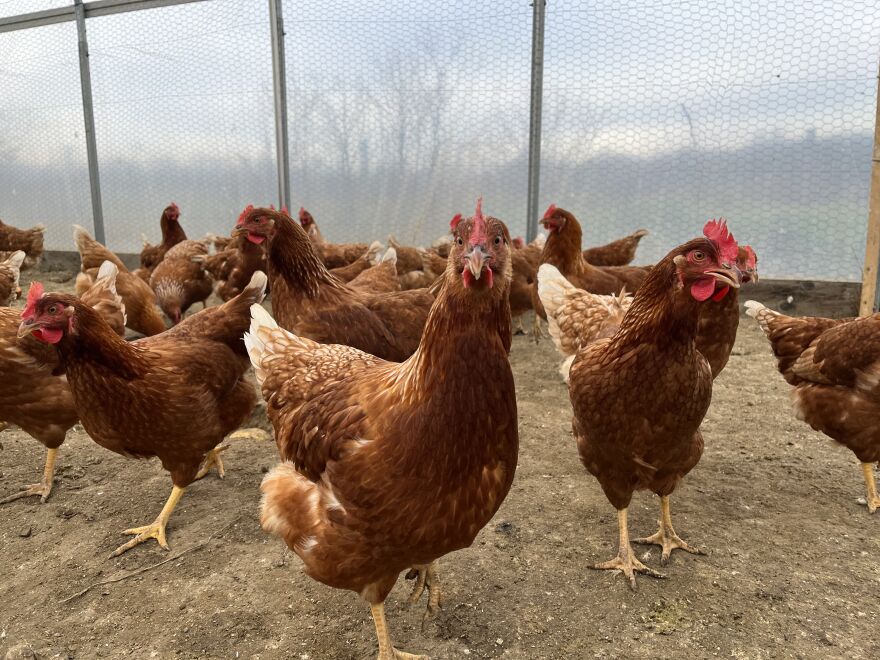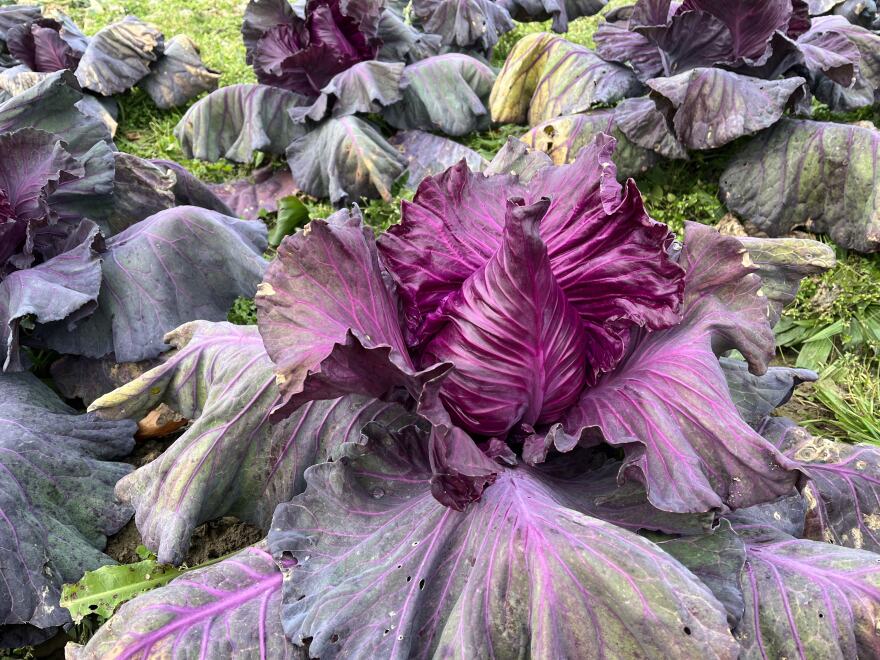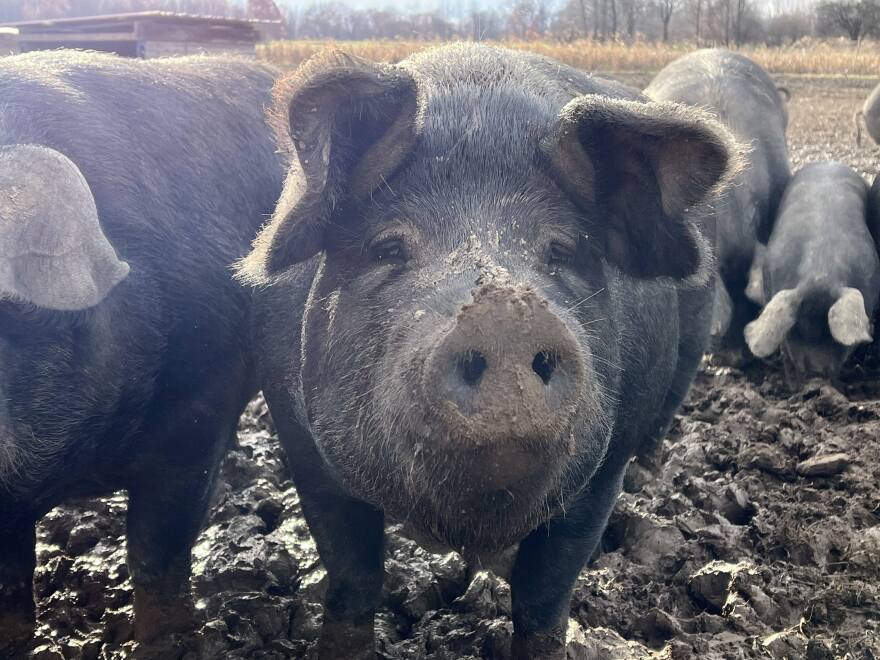The first thing you see as you approach Edible Earth Farm in Sandy Lake, Pennsylvania are four high tunnel growing structures. They look like long tents, and they are made of metal frames with greenhouse plastic stretched over them. Inside, there are long rows of vegetables, including broccoli raab, beets, radicchio and snow peas.
Johnny Parker is co-owner of Edible Earth with his spouse, April Parker, and he says the high tunnels are critical to the success of the farm. In northwestern Pennsylvania, the last spring frost isn’t until the end of May, which means the growing season is only four months long. The high tunnels shelter crops from the cold.
“It allows us to have fresh product almost year-round,” Parker said.
One of the high tunnels is also home to a flock of 100 chickens. They peck at the remnants of harvested crops on one side of the structure.
“We use chickens in the high tunnels as a way to fertilize the soil and to turn the greens into protein, in the form of eggs,” Parker said.

But the high tunnels need maintenance. The greenhouse plastic degrades in the ultraviolet light and needs to be replaced every four years. But the cost of the plastic has recently doubled. And Parker says the high tunnel structures themselves are basically unaffordable at this point. A year ago, he bought one for $9,000, but now the price is over $20,000.
“It's hard not to be depressed,” Parker said. “I was shocked. I don't know if I'll ever be able to afford another one again or justify the price.”
At the beginning of the pandemic, people turned to local producers when grocery stores had empty shelves. For local organic farms, that meant a big bump in demand for their vegetables, meat, dairy and eggs—and a historically good year.
Some farms ramped up production for a big 2021 season, but many of the new customers didn’t stick around when pandemic restrictions eased up. Now, with inflation impacting nearly everything, farmers are facing even more uncertainty as they look ahead to the 2022 season.
Phil Taylor is a business consultant at AgChoice Farm Credit, a Pennsylvania-based cooperative that provides loans and financial services to farms.
“I'm an older guy,” Taylor said. “I can say that in my tenure working in agriculture that we haven't seen this kind of inflation where almost everything is increased.”
He says the high prices of farming inputs and materials really impact a farm’s bottom line, because farming is already a low-margin industry. In his work with local farms, he says he counsels farmers to aim for their operating costs to make up around 75% of their gross income.
“That provides the farm business with a margin then that they can replace capital, it can pay interest on borrowed funds, and then they can compensate the owners,” Taylor said.
He says when farming inputs become as expensive as they have, a farm’s operating costs can rise to around 90%.
“That really pinches that margin for the farmer,” Taylor said. “It’s a different kind of dynamic and it’s just making it difficult on the profitability for the farms.”
Taylor says one of the things that’s gone up the most is fuel. Farms need natural gas to heat greenhouses and diesel to drive tractors and transport food to markets.
But farmer Don Kretschmann thinks high fuel costs aren’t always a bad thing.
“I've always thought since we were in the vegetable business, that increases in fuel costs were good for us,” Kretschmann said. “We are selling primarily to a local market, whereas our competition is being shipped from across the country.”
Kretschmann retired from Kretschmann Organic Farm in Rochester last year. He says farmers have always had to ride out periods of inflation—and they do it by hedging. When revenue is high or prices are low, they stock up on seed and fertilizer they’ll need for the year. In bad times, they might hold off on a big purchase like a tractor.
Kretschmann said he thinks that in some cases, local organic farms may have an edge right now because they don’t depend as heavily on inputs like fertilizer.
“I'd say for at least 10 or 15 years, I have not really bought any of that, and instead grown my own nitrogen by planting alfalfa,” Kretschmann said.

Some local organic farmers are beginning to think beyond the usual strategies. Nigel Tudor of Weatherbury Farm in Avella grows organic grain and mills flour. During the pandemic, the farm lost most of its restaurant sales, but they more than made up for it in direct sales. People were cooped up at home and started stress-baking, which led to a nationwide flour shortage and lots of demand for the farm’s flour.
But Tudor say’s the farm’s revenue is down this year.
“[People] are not baking as much at home,” Tudor said. “And we haven't gotten restaurant sales back because a lot of the restaurants have either closed or they have limited menus.”
In the meantime, everything has gotten more expensive. Tudor said when he compared this year’s prices to last year's, he found lumber had gone up as much as 74%, diesel by 82%, gas by 32% and product packaging by 33%.
“We filled up our farm diesel tank and that same day we got heating oil, and I think it was about $1,500 more that we spent than we had the previous year,” Tudor said. “Just imagine something that costs $1,500 and previously you could have bought that, but now, you can’t.”
Instead of waiting for prices to fall or business to pick back up, Tudor says Weatherbury is trying to diversify.
“We're building a wood-fired bread oven and we're hoping within the next six months to a year to launch a wood-fired bakery on our farm here,” Tudor said. “You have to adapt to the market.”
At the new bakery, he says he hopes to offer classes and sell ready-made bread, and maybe that will help the farm attract new customers.

At Edible Earth Farm, Johnny and April Parker hope that some of the choices they have already made will help them succeed despite the high prices—like the decision to raise pigs. Parker says pigs do some of the work a tractor would do, like clearing and fertilizing.
“They keep the weeds down, they fertilize, they pull the rocks to the top,” Parker said. “All things that you would otherwise have to do with a tractor and use fuel for it.”
But the Parkers are still worried as they look ahead to the 2022 growing season.
“It's just really impacted every part of our business because we grow vegetables—and you can only charge so much for a tomato,” said April Parker.






